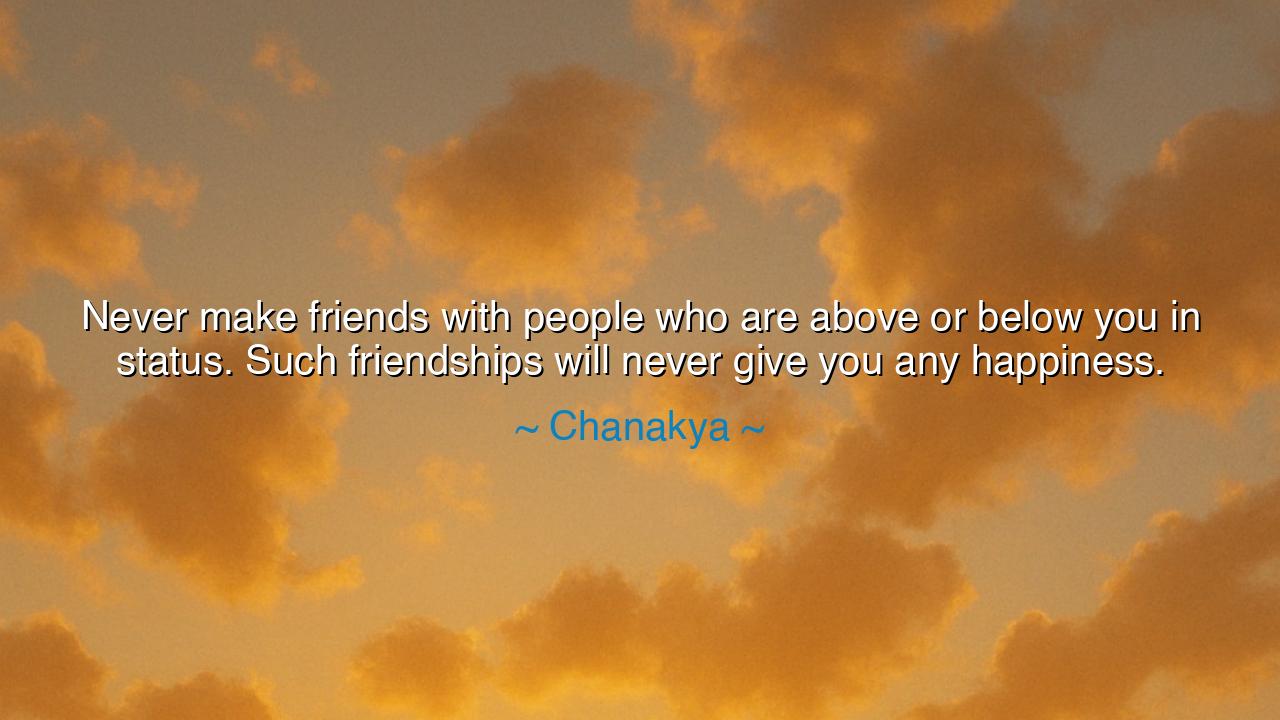
Never make friends with people who are above or below you in
Never make friends with people who are above or below you in status. Such friendships will never give you any happiness.






“Never make friends with people who are above or below you in status. Such friendships will never give you any happiness.”
Thus spoke Chanakya, the ancient sage and political philosopher of India, whose wisdom shaped empires and whose words still echo across the centuries. Known also as Kautilya, the author of the Arthashastra, he was both a thinker and a strategist—a man who understood not only the laws of kingdoms but the subtleties of the human heart. In this saying, he warns of the delicate balance that governs friendship, and how differences in status, whether of wealth, power, or position, can poison the harmony that friendship requires.
To the modern ear, Chanakya’s words may sound stern, even cold. But beneath their sharpness lies a deep realism born of experience. For he knew that equality is the soil in which true friendship grows. When one stands above the other, pride and dependence take root; when one stands below, envy and insecurity creep in. Happiness, that fragile flower, cannot blossom in such uneven ground. Friendship, he teaches, must be between equals—where respect flows naturally, without fear or flattery, and affection is given freely, not as a debt or a favor.
Chanakya lived in an age of kings and scholars, of courtiers and servants, where the bonds of loyalty were often bound by power, not love. He served as the chief advisor to Chandragupta Maurya, the first emperor of a united India, and in the fires of politics he learned that relationships across great divides often lead to pain. A king who befriends a commoner risks betrayal; a commoner who seeks the friendship of a king becomes enslaved by gratitude. In both cases, the balance of hearts is lost. Hence, Chanakya’s counsel is not a call to arrogance or disdain, but to wisdom—to the recognition that true friendship must rest on mutual equality of spirit and circumstance.
Consider the story of King Lear, from a land far beyond Chanakya’s own, yet echoing his same truth. Lear, a mighty ruler, sought love and companionship among his daughters, but his rank clouded his vision. When power and affection mixed, truth vanished. His flatterers thrived, his loyal friends suffered, and his kingdom fell into ruin. Lear’s tragedy reveals what Chanakya foresaw: that friendship cannot survive where one must bow and the other command. For friendship demands balance, and when that balance breaks, even love turns to sorrow.
Yet we must look deeper still. Chanakya’s wisdom is not merely about social rank or wealth; it speaks to a greater harmony of the soul. If one friend is ruled by greed while the other by virtue, if one seeks advantage and the other seeks connection, their hearts can never truly meet. Equality of values, temperament, and understanding are the true measures of status. To walk beside someone as a friend, your steps must fall in rhythm; if one runs ahead and the other lags behind, neither will find joy in the journey.
Still, Chanakya’s teaching does not command us to shun all who differ from us. It reminds us to be mindful of the nature of each bond. With those above us, we may cultivate respect and learning; with those below, compassion and guidance; but friendship, in its purest form, belongs among equals. For only there can one speak freely, laugh without fear, and share without measure. In equality, friendship becomes a mirror—each reflecting the other’s soul without distortion.
Let this, then, be the lesson: choose your friendships not by appearance or opportunity, but by harmony of heart. Seek those whose spirits walk beside yours—not towering above, not kneeling below. Cherish those who speak truth to you, not those who flatter; those who understand your silence, not those who seek your favor. Remember that friendship is not a chain but a bridge—strong only when both sides stand level.
Thus, Chanakya’s wisdom stands as a timeless guide: do not mistake connection for friendship, nor power for affection. Friendship is a sacred balance of trust, equality, and mutual respect. Where these exist, happiness flows like a river between two souls; where they do not, even the grandest bond will crumble into dust. Walk, then, with equals—not in pride, but in peace—and you will find in their company not only happiness, but the quiet, enduring strength of true friendship.






AAdministratorAdministrator
Welcome, honored guests. Please leave a comment, we will respond soon